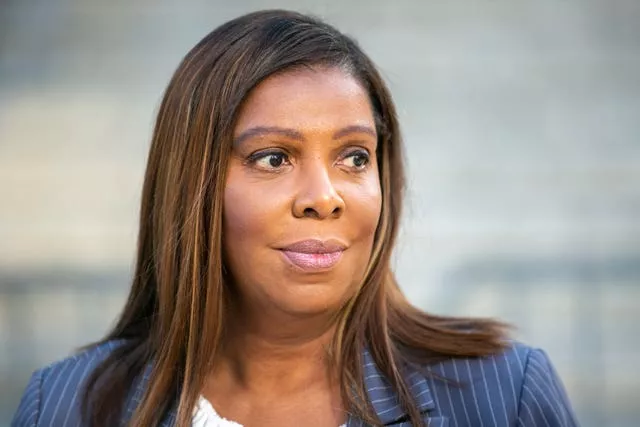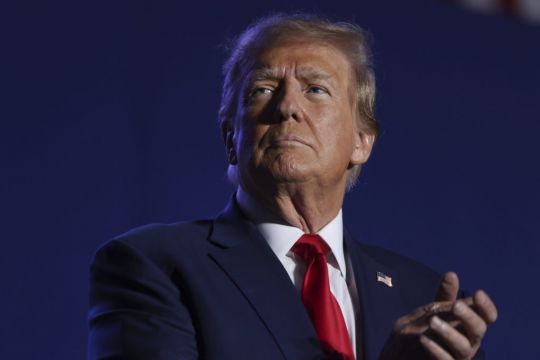New York state lawyers increased their request for penalties on Friday in Donald Trump’s civil business fraud trial, while his defence argued that no evidence of fraudulent intentions or ill-gotten gains has been shown in weeks evidence.
Closing arguments are set for Thursday and Mr Trump is expected to attend.
It will be the final chance for state and defence lawyers to make their case in a lawsuit that is consequential for the leading Republican presidential hopeful even while he fights four criminal cases in various courts.
The New York civil case could end up barring him from doing business in the state where he built his property empire, and state Attorney General Letitia James is now seeking more than 370 million dollars (£290 million) in penalties. The figure emerged in her office’s filing on Friday; the state had sought 250 million dollars (£196 million) before the trial but had nudged the number to more than 300 million dollars (£236 million) during the proceeding.
Ms James’ lawsuit accuses Mr Trump, his company and key executives of deceiving banks and insurers by vastly inflating his net worth.

Ms James argues that Mr Trump got attractive rates on loans and insurance because of the wealth he claimed on his personal “statements of financial condition” or “SFCs” for short.
The suit alleges that the documents gave exorbitant values for golf courses, hotels, and more, including Mr Trump’s former home in his namesake tower in New York and his current home at the Mar-a-Lago club in Palm Beach, Florida.
“The conclusion that defendants intended to defraud when preparing and certifying Trump’s SFCs is inescapable,” Kevin Wallace, a lawyer in Ms James’ office, wrote in a filing on Friday.
“The myriad deceptive schemes they employed to inflate asset values and conceal facts were so outrageous that they belie innocent explanation.”
The defendants, including his sons Donald Trump Jr and Eric Trump, deny any wrongdoing.
The former president asserts that his financial statements actually came in billions of dollars low, and that any overestimations — such as valuing his Trump Tower penthouse at nearly three times its actual size — were mere mistakes and made no difference in the overall picture of his fortune.
He also says the documents are essentially legally bulletproof because they said the numbers were not audited, among other caveats. Recipients understood them as simply starting points for their own analyses, the defence says.
None of his lenders testified that they would not have made the loans or would have charged more interest if his financial statements had shown different numbers, defence lawyers wrote in a filing on Friday for Mr Trump, his Trump Organisation and some executives.
The state “adduced no factual evidence from any witness that the gains were ill-gotten,” lawyers Michael Madaio and Christopher Kise wrote. Nor, they said, was there proof that insurers were ripped off.

Separately, defence lawyers argued that claims against executive vice presidents Eric Trump and Donald Trump Jr should be dismissed because they never had “anything more than a peripheral knowledge or involvement in the creation, preparation, or use of” their father’s financial statements.
The sons relied on the work of other Trump Organisation executives and an outside accounting firm that prepared those documents, lawyers Clifford Robert and Michael Farina said.
Their father also took the stand and made a stream of comments in the court hallway. He painted the case as a political manoeuvre by Ms James, Judge Arthur Engoron and other Democrats, saying they are abusing the legal system to try to cut off his chances of winning back the White House this year.
The verdict is up to the judge because Ms James brought the case under a state law that does not allow for a jury. Mr Engoron has said he hopes to decide by the end of this month.
In addition to penalties, Ms James wants Mr Trump to be prohibited from doing business in New York.
During the trial, Mr Engoron fined Mr Trump 15,000 dollars (£11,700) after finding that he violated a gag order that barred all trial participants from commenting publicly on the judge’s staff. The order was imposed after Mr Trump maligned the judge’s principal law clerk.
Mr Trump’s lawyers are appealing against the gag order.
The filings were revealed after five Republican and Democratic voters in Massachusetts became the latest to challenge Mr Trump’s eligibility to appear on the Republican primary election ballot, claiming he is ineligible to hold office because he encouraged and did little to stop the January 6 2021 attack on the US Capitol.
The challenge was filed late on Thursday to Massachusetts Secretary of State William Galvin’s office ahead of the March 5 presidential primary. The State Ballot Commission must rule on the challenge by Jan. 29.
The challenge, similar to those filed in more than a dozen other states, relies on the 14th Amendment to the Constitution, which prohibits anyone from holding office who previously has taken an oath to defend the Constitution and then later “engaged in insurrection or rebellion” against the country or given “aid or comfort” to its enemies.







